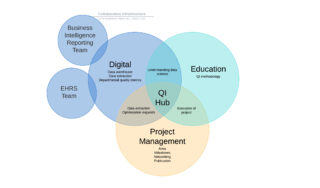Q Exchange
Digital QI Hub
- Proposal
- 2022

Meet the team
Also:
- Dr Melanie Tan, Digital Lead for Theatres & Anaesthesia
What is the challenge your project is going to address and how does it connect to the theme?
Our organisation has 10,000 staff divided into departments which all have a similar structure to ours. We have 500 staff with a variable level of digital ability, some users really struggle with just using the electronic health records system whilst others are more skilled. Proficient use of the EHRS gives good quality robust data which can be used for QI projects to improve the standards of patient care. The vast amount of data currently generated maybe difficult to access and utilise for QI purposes.
Moreover, free text is extremely hard to extract with any accuracy and upskilling of the end user staff is needed to understand how best to input data and why it’s important.
Collaboration between the education and data teams will create an agile infrastructure for clinicians to access data for QI purposes and this platform will successfully set the Trust up with a sustainable improvement culture.
What does your project aim to achieve?
To put together an infrastructure to help clinicians access digital data for QI projects.
To deliver structured learning to improve digital understanding for healthcare professionals with no background or previous experience in digital healthcare.
Running a digital QI hub would align departments and coordinate projects. It would help staff learn about the improvement process, support people with networking and help them think differently about data. Data input and interpretation would improve.
It would also address inequalities and upskilling of staff will improve support they can give to patients.
The project would support existing and ongoing QI project throughout the Trust, for example the Enhanced Recovery peri-operative pathways.
How will the project be delivered?
A project team will create a departmental working group that will collaborate with the other teams with necessary skills. The Trustwide EHRS training team are able to embed this into curriculums for the rest of the hospital. Staff will learn about the importance of basic data input, how data warehouses work and how to look for to access and extract data.
Individuals need to adapt data collection and interpretation in a different way, compared to traditional methods of reviewing paper or electronic charts. E.g. what is system vs structured data, what is easy to extract vs difficult and why, pitfalls of data warehouses and how code can rapidly extract large datasets for clinician use.
Value for money = clinician skill used to interpret & use data, more powerfully deliver improvement ideas, monitor these improvement ideas appropriately with data dashboards. Creates a data warehouse for use by other clinicians in future = much faster
How is your project going to share learning?
The learning from this model is applicable to all healthcare institutions that use an EHRS – the importance of data and how to access it is a key skill in the digital future.
Cerner Millenium is one of the most popular EHRS platforms installed in many Trusts nationwide and Epic is also gaining traction. Both systems have a similar data warehouse structure so this approach would work in most institutions and provide a template structure on how to set up a similar QI Hub.
How you can contribute
- - Sharing of best practice
- - Sharing of QI methodology teaching resources
Plan timeline
| 3 Aug 2022 | Planning |
|---|---|
| 1 Sep 2022 | Engagement with Stakeholders |
| 31 Dec 2022 | Development of educational materials |
| 7 Mar 2023 | Training rolled out and first QI projects supported |
| 28 Jul 2023 | Trust-wide roll out. |
Comments
Emilie Martinoni Hoogenboom 21 Mar 2022
The unintended consequences may be information overload for already stretched clinicians, though after the initial "learning curve", everyone's workload will be automated and digitalised.
Emma Sutton 9 Mar 2022
I love this idea of a hub to align departments and coordinate projects - do you mean that it could be used by physios doing a project on orthopaedic ERAS Length of Stay to see if there are other projects being run by - for example - colorectal nurses in colo-rectal prehab (which might impact LOS) so that they could join forces and share data? We have a similar idea - we want to network like this , but with other teams delivering education/bridging programs to aspiring clinical academics - we want to use this hub to learn from and identify positive deviance. So my question is - how will you practically create this hub so that people can effectively link? Why is it better doing it this way, instead of just picking up the phone and calling the other team? What about the un-intended consequences of this 'hub; approach?
Emilie Martinoni Hoogenboom 21 Mar 2022
Thank you Emma for your comment.
We are lucky that the view and utilisation of our EHRS already allows information to be made available cross-disciplines. Info about the Hub and ongoing projects would be made available on the Trust website and information disseminated across specialties via newsletters, clinical governance meetings etc.
Our EHRS also allows the creation of "groups" similar to WhatsApp.
Comments are now closed for this post.